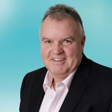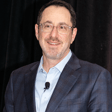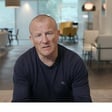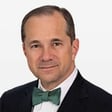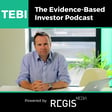Become a Creator today!Start creating today - Share your story with the world!
Start for free
00:00:00
00:00:01

Ep 25: Rick Ferri on life and investing after Jack Bogle
A former US Marine Corps officer and fighter pilot, Rick Ferri talks about his experiences as a stockbroker at a large Wall Street firm, and how he became disillusioned with the industry, its sales culture and its high fees.
He explains how he built a business called Portfolio Solutions, which enabled investors to achieve much better results by cutting the amount of fees and charges they paid. He also discusses his latest business venture, Ferri Investment Solutions, a pay-by-the-hour financial advice service, and offers his views on how the advice profession is changing.
Transcript
Introduction to Evidence-Based Investing
00:00:04
Speaker
Hello and welcome to the latest Tebby podcast, brought to you by Regis Media, connecting advisors with clients. If you're interested in evidence-based investing and how the financial industry really works, you've come to the right place.
Rick Ferry's Journey: From Pilot to Financial Advisor
00:00:20
Speaker
Our guest on this episode is Rick Ferry. A former US Marine Corps officer and fighter pilot, Rick started his investment career in 1989 as a stockbroker at a large Wall Street firm. After a few years in the industry, he concluded the sales culture and high fees didn't meet his ethical standards.
00:00:44
Speaker
So he built a business called Portfolio Solutions, which enabled investors to achieve much better results by cutting the amount of fees and charges they paid. He now runs Ferry Investment Solutions, a pay-by-the-hour financial advice service. Rick joins us now from his home near Austin, Texas. Well, Rick, thank you so much for finding time for joining us.
00:01:12
Speaker
It's a pleasure to be with you, Robin. Now, I was trying to remember the first
The Case for Low-Fee Index Investing
00:01:17
Speaker
time we met. I think it was at a Bogle heads conference in Pennsylvania, I think either six or seven years ago. You, of course, were a very big fan and friend of Jack Bogle. We were making a documentary at the time, Passive Investing the Evidence, and you featured quite prominently in it.
00:01:35
Speaker
And just one part of your interview, I particularly remember, and it was talking about this kind of light bulb moment that you described yourself having and that you feel that most passive investors, if you like, actually have. Can you explain what was that light bulb moment for you? Well, I call it the aha moment. It's sort of an enlightening where you realize that
00:02:01
Speaker
you're not doing well investing the way you're told to invest by the industry and that you've done a little calculation and you figured out that if you just got the return of the markets, you'd probably be doing a lot better than following the advice that you hear in the media or by a lot of the advisors out there that are maybe have an ulterior motive.
00:02:29
Speaker
So when you have that awakening, that aha moment, you begin to take matters into your own hands and you begin to start researching low fee index investing and that's the direction you go and you never go back.
00:02:47
Speaker
Why do you think so few financial professionals or relatively few professionals have had this aha moment? There is a famous quote, isn't there? Is it Upton Sinclair who said, it's very difficult to persuade someone of something when their salary depends on not understanding it, basically. Why do you think that is?
00:03:16
Speaker
I think a lot of advisors are afraid that if they start telling their clients that, number one, they were wrong. A lot of advisors don't want to admit that, of course. But number two, if they can get over that and they can say that they had an epiphany and that through their learning or through their education, they've come to the conclusion, maybe even with their own analysis, however they want to put it.
00:03:40
Speaker
go to the clients and say, we're going to move over to low cost passive investing, that the clients will say, well, what do I need you for? If that's all you're going to do is buy a few index funds. Now I'll tell you from experience, that doesn't happen. It just doesn't happen. The clients are trusting in the advisors. And if the advisors go to the clients and say, we're just going to move over to all passive investing because that's what I believe in now.
Challenges in the Advisory Industry
00:04:07
Speaker
almost all the clients will do it. But it's the problem with the advisors. They have to get over that. And so the advisors may have had their aha moment. They may have realized that passive investing and low fee investing is the way to go. But they have a problem from a business sense of admitting it to the clients and going that direction. Let me give you a quick story. Oh, it must have been 10 years ago I was sitting on a panel at an ETF conference down in Florida with probably one of the most famous
00:04:37
Speaker
advisors in the US at the time, and it was an active versus passive panel, where there was a couple of us who were doing passive investing, indexing only, and there was a couple of other advisors who were still hanging on to active management. And this fellow who was very well known, and I won't mention any names, he was on the active side, and he was giving his reasons, and I was giving my reasons. But at the end of the panel, he turned to me and he whispered to me, Rick, if I was going to do it all over again, I'd do it your way.
00:05:08
Speaker
I know, I know. I mean, this is largely, isn't it, a generational thing. I don't know what the situation is in the United States, but certainly here in the UK, I would say that the average age of a financial advisor is certainly north of 45 or 50. And I suppose the longer you've been advocating a particular
00:05:31
Speaker
particularly if you've done quite well out of it financially, it's very, very difficult to turn things around and almost kind of turn the whole business philosophy of your advice firm on its head.
00:05:47
Speaker
Yeah, we have a saying here in the US that there's a lot of advisors who are just trying to get to retirement where they can sell their practice and move on because it's too difficult for them to make the change. And it's too difficult for them to make the change on their fees too, which is another revolution that's occurring. But how are they going to sell their business, Rick, if it's built on a defunct business model or dying business model?
00:06:14
Speaker
Well, there's going to be evaluation. Of course, it's buyer beware, whoever the advisor is that's going to come in and buy their book of business has to look at what that book of business looks like and make a determination of the future revenues that the advisor can get off of that book of business with maybe a new different fee model.
00:06:33
Speaker
different investment philosophy. And it just all comes down to a valuation of the business and what somebody's willing to pay
Rick's Investment Philosophy and Business Ventures
00:06:42
Speaker
for it. So there is a market there. It's just a matter of a discount rate for what the book currently looks like versus what the new advisor who might be buying it would make it look like and what you're going to lose in the middle. So it can be done. It's just a
00:07:00
Speaker
valuation model that you need to, by the way, it's the seller who has to accept this, not the buyer, because the seller is always the one who thinks it's worth so much money. And now the buyer is going to come in and look at it and say, it's not really worth that much. So like I said, it's just a lot of advisors who are just hanging on with the 1% fee models and maybe doing some active management or core and satellite, which is just not as good as old passive.
00:07:31
Speaker
and just waiting to retire and this new generation coming in. Rick, if I could just ask about your background, I can see on the wall behind you pictures of military helicopters and so on. So you have a military background and then you worked on Wall Street, I understand, for a while.
00:07:51
Speaker
Well, that's correct. I graduated from the university in 1980 with a degree in business administration. And I went into the military and I became a pilot. I was actually a jet pilot, although the pictures on the back of me are helicopters. It's actually a picture of the helicopters. My son is flying in the military. So, yeah. It's the other family business that we have, military. Anyway,
00:08:17
Speaker
So, after I did that for about eight years, I left and went into the brokerage industry, and that's where I started my career. I also stayed in the military reserve and retired after 20 years, which you can do in the States. So, I have a reserve military retirement. But that's how I ended up starting in the investment industry. I was in the military first, and then when I got out after eight years, I went to Wall Street.
00:08:42
Speaker
And to cut a very long story short, you ran for many years or at least helped to run a very successful business called Portfolio Solutions. Tell me about that. So I was disenchanted after a few years in the brokerage industry because it was this high cost product sales thing going on. I had achieved my CFA charter, Charter Financial Analyst Charter, and I had received my Master's of Science and Finance. And I was very disenchanted with
00:09:12
Speaker
how things were going in a basic Wall Street firm, the high fees and underperformance and such that I decided I was going to start a low-fee money management company where all we used were low-fee index funds and clients portfolios and then I charged a low fee. So I started this small company out of my living room called Portfolio Solutions which grew into a large company and many employees which I recently sold
00:09:36
Speaker
And your latest venture is called Ferry Investment Solutions and your website describes it as as needed financial advice and of course you charge by the hour. What was the thinking behind that?
00:09:52
Speaker
But there was a lot of do-it-yourself investors and a lot of investors who were using an advisor, who terminated the advisor relationship for one reason or another. In many cases, it was the fees that the advisors were charging. And they still needed guidance. They still needed advice. But they wanted to just get it as needed. So pay for an hour of time, maybe an hour and a half of time.
00:10:15
Speaker
or whatever it was that they needed. And so I saw an opportunity to launch a new business that I could just basically run on my own as a solo consultant where people could talk with me for an hour, they'd send me their portfolios, I would go over them.
00:10:33
Speaker
with the clients, write something up at the end, and then send them on their way. And then they could implement this and make their portfolio simpler, easier, downsize the portfolio. It's worked out extremely well. There is a huge, huge, huge demand. I can't overemphasize how big the demand is for this type of service. So it's gone very well. I've only been doing it now for about three weeks.
00:11:03
Speaker
when I opened the company because of the non-compete that finally ended. But it's a huge business model, meaning that there's so much demand for it.
Advisory Models: US vs UK
00:11:11
Speaker
Excellent. OK, we'll go on to talk about that in a moment. If I could ask you, first of all, of course, you and I know that much of the advice industry in the United States, it's a concept we don't...
00:11:27
Speaker
necessarily have over here in quite the same way. You have a kind of brokerage industry, which as I understand it is a kind of cross between a sort of financial advisor and a stock broker, if you like. And largely they're funded by commissions. And over time, the client will actually pay a lot of money, even if they're not aware that they're paying a lot of money for that advice, if you like. Whereas if you're charging hourly advice,
00:11:57
Speaker
You know, you presumably have to ask them to write you out a cheque for quite a large sum of money for even one hour of advice. Is that right? Well, I charge $450 an hour and I have a special for new clients, which I call a portfolio second opinion. And for $500, I spend an hour and a half looking over their information
00:12:26
Speaker
and on the phone with them and then writing up something at the end. And that generally covers most of their questions. It's a very small amount compared to the amount of fees currently paying. And so it might seem like it's high, but there are other people who are doing this.
00:12:48
Speaker
through networks such as the Garrett Planning Network that might charge $250. So you can shop around and find an hourly advisor who might be less expensive than me. But in the scheme of things, based on the fees that they're currently paying and the funds that they have or the advisor who's advising their accounts, it's in the thousands of dollars. So I don't like to say it's justified from that perspective, but it is lower cost than
00:13:18
Speaker
than what they're currently paying. Rick, I'll be honest, I was expecting you to say more than $450 an hour, but you're saying that, never mind the price, there is a huge demand for
Portfolio Insights and Common Mistakes
00:13:31
Speaker
it. So tell me about that. What sort of response have you had in the first three weeks of operating?
00:13:39
Speaker
Well, I can tell you my numbers. I've had 165 people contact me. I've done so far 30 hour and a half consultations, one-time consultations, and my calendar is getting booked quickly. And the word is just beginning to get out. I haven't really done a lot. This is just
00:14:03
Speaker
sort of built up demand, if you will, from people who have heard that I started doing this. But I'm learning a lot, Robin, by looking at all these different portfolios. And I see a lot of similar characteristics in portfolios that I can draw from and begin writing about where I see the common mistakes. You know, in here we have taxable accounts and then we have
00:14:29
Speaker
tax deferred or tax preference type accounts, retirement accounts. And I see a lot of mistakes where people are putting the wrong things in the wrong accounts and they have too much one type of account and not enough in another account. And they're not utilizing all of their resources that they have available to them. So there's a lot of commonalities. I'm putting together a list of things that can help people. But I think that there is a
00:14:57
Speaker
There is a distrust, if you will, growing out there from the people I've talked with about advisors in general, not just the brokerage side, but the AUM side, the people that are charging high assets under management, such as 1% or more. People just don't want to pay that. They don't want to pay that much money anymore. They know that returns from the markets may not be what they were in the past, and to pay 1%
00:15:23
Speaker
per year to have a portfolio of mutual funds managed, people beginning to realize that's a lot of money and becoming very fee-conscious on everything, not just the mutual funds, but also how much they're paying an advisor. So I'm getting a lot of people contacting me after they've terminated their advisor relationship, saying to me, OK, now I have this portfolio. How do I consolidate it? How do I make it manageable where I can manage it going forward with just a little bit of my time? And I think there's a big, big market. This is the next wave.
00:15:52
Speaker
of consulting, I believe. Interesting. So you generally find, do you, Rick, that an hour and a half is enough to sort what can be quite a complicated situation out? And then presumably on top of that, you have to do, I don't know, maybe another hour or so writing up the notes and formally giving advice.
00:16:13
Speaker
Generally, I ask them to take very good notes so that I don't have to spend another hour writing up the notes. But I generally try to keep it down to an hour and a half if there's time permitting. It takes me about 15 minutes to look over all the information before I have this hour meeting. And then during the meeting, the meeting may only last 30 minutes. Depending how complicated it is, it could last an hour. And then at the end of it, I've got a little extra time to write up a few notes about the major things we talked about. And that's an hour and a half.
00:16:43
Speaker
Out of the consultations that I've done so far, the 30 consultations, more than 90% of them that took care of it. There's been a couple where I've needed to spend another hour or two because it was more complicated. And I tell them during the hour and a half, during the call that we have, I tell them that if you want me to spend more time
00:17:06
Speaker
writing up each individual account and telling you what you should do in each account, which fund to sell, which fund to buy, and so forth. I mean, getting very specific and very detailed. It might be another hour or two at $450 an hour, and they give me permission to do it. Or maybe not. Maybe they say, no, I think I can handle it. I got the general idea. So I leave it up to them.
00:17:24
Speaker
So there's much discussion globally about advisor theme models at the moment. Generally speaking, there's a move away, thankfully, from the kind of old ad valorem model. But I suppose that there is still something to be said for ad valorem in that it
00:17:44
Speaker
at least subsidizes advice for people who otherwise wouldn't be able to afford it. What would you say to that argument? Basically, the larger clients pay more money so that some smaller clients can get advice that they wouldn't ordinarily get.
00:18:03
Speaker
except for the fact that once an advisor has been in business for a while, they don't want smaller clients. They just want the larger clients. So that might work initially with an advisor who's just getting started because they'll take any business. But after a while, an advisor who's been in business will realize that
00:18:21
Speaker
They can't do the small clients because there's not enough money there. They need to make a certain minimum amount, say $2,500 a year to break even on a client. And if a client doesn't have enough assets, you just can't take them as a client. You have to just recommend they go somewhere else. That's just the reality of the advisor business because as you get more successful, you only want big clients because that's where the margins are.
00:18:49
Speaker
Yeah, so it is a welfare system at the beginning, but then as the advisor gets larger, it becomes a race, if you will, as the advisor's overhead goes up, the advisor needs to bring on bigger clients so that they can pay the overhead. It's an economic model of an advisor, and we can get into the details of it, but I understand
00:19:09
Speaker
You know, it's always been a problem. The conundrum has always been, what do you do with the small clients? And this is where companies like the Robo advisors have come along and said, we can service them. And I think that's a good model. And I think in the next generation, that will be the way that the advice is going to be dispensed through Cypher for Robo.
Innovations in Fee Models and Advisory Services
00:19:25
Speaker
But that's the next generation as these older advisors gray out and eventually retire and their children and grandchildren go to the Robo models, that's probably going to work. But right now we're in this
00:19:38
Speaker
phase where this transition is just beginning. And what about the subscription fee model? We're starting to see more and more of that in Europe. I don't know if you're experiencing the same in the US.
00:19:51
Speaker
Sure, we have the XY planners who have started a subscription service, if you will. They're part of Michael Kitsch's and Alan Moore's group. There's quite a bit of them now. I think there's over 750 XY. A lot of them are doing monthly subscription. So depending on the complexity,
00:20:09
Speaker
of a client, maybe somewhere between $150 and $300 a month, and you have full access to an advisor. So that's another way of addressing the demographics of the younger client who doesn't have that much money and just pay a monthly fee. And with your hourly model, do you recommend that your clients come back to you, say in a year's time or in two years' time? How does that work?
00:20:34
Speaker
I don't recommend that they do anything other than take the advice that I'm giving them on that particular day and say here it is and then I basically say if you need me in the future just get on my calendar and schedule another hour because I already have all of your information just schedule an hour.
00:20:50
Speaker
And we can talk about whatever you need to talk about. Send me an email and tell me what it is you want to talk about. If it takes 30 minutes, then it only takes 30 minutes. I just charge you for 30 minutes. So I don't say to them, let's meet in an hour. Let's meet in a year. Let's meet in six months. I don't say that at all to them. I leave it completely up to them. If what I've given them is good and they never contact me again, that's fine. I believe that's the advice I am giving them. But if they want to at some point contact with me again, that's fine as well.
00:21:21
Speaker
There is quite a downward pressure on fees, advisor fees generally, whatever the charging model, and presumably your model, this hourly model, is only going to add to that pressure. Is that something you would accept?
00:21:40
Speaker
I call it a decoupling, a decoupling of the fee. So you're a decoupling of the advisor fee, so you're giving straight advice through an advisor fee that is an hourly fee or a subscription fee like we talked about or maybe an annual retainer, but it's a decoupling of the size of the client's portfolio from the advice you're giving them. I just don't see
00:22:05
Speaker
a clear relationship between somebody who has $50 million or $500,000 or $500,000, why you would charge one person more money just because they have more money. Now, it might be more complicated because they have more money, so it might take a little bit more time, but it doesn't take 10 times the amount of time or 50 times the amount of time. So I want to better align the advice portion of this with the actual
00:22:34
Speaker
work that's being done. Then there's the second part of this, which is the management, the implementation. And there either the clients can do it themselves or they can hire a firm to implement the plan that the advisor comes up with. And here is where I'm trying to shake up the industry again. Normally when you go to an advisor, they say, okay, we will do the plan and then we will implement it. Well, here you have an outside advisor doing the plan.
00:23:00
Speaker
And when it comes to the implementation of that plan, going to an advisor and saying, we already have the plan. We already have the portfolio. All we need to do is implement it, maintain it, rebalance once in a while, tax manage, cash manage, do the things that you do as an asset manager, and we will pay you a small annual fee of perhaps a quarter of a percent per year with some minimum to do that. So it's a decoupling of this
00:23:28
Speaker
advisor slash money management model so that you're separating the advice part, charging for that, and then putting the management portion on an advisor at a low fee where they can just implement it through their systems, which they already have, the technology is very good, and it just reduces the overall cost for the client.
00:23:48
Speaker
So what would you say to those who'd suggest that what you're offering really is effectively just, and I don't mean that lightly, but just investment advice if you like, and that actually you don't offer anything like the scope of services that you would get, for example, from
00:24:10
Speaker
a financial planner. I mean, you're not actually working out what their goals are, what they want to achieve, and then coming up with a plan that matches those goals. What would you say to that? And do you think in a sense that clients are missing out on something that they might get if they went to a financial planner?
00:24:36
Speaker
Well, I think that what you talked about, their goals and what they want their money to do for them is all part of the investment planning advice process that falls under investing. If you're talking about what type of health insurance they should carry or exactly what type of a trust they might establish for a child that has special needs, things like that, yes, I don't do that. I would send them on to somebody who is a specialist in that area.
00:25:02
Speaker
But a lot of things like, do I have enough money to retire? And how much do I need to retire? Those things are investment-related questions and they fall under the advice that I give.
00:25:16
Speaker
So it is pretty broad, but it doesn't get into other areas, as I mentioned. And for those, I would send them on, if they had those questions, I would send them on to a service that actually finds a financial planner who can answer those
Vanguard's Impact and Industry Standardization
00:25:32
Speaker
questions. It's a service here called Advice Only Financial. And basically for $200, the fellow who runs that, Harry Sit, will be able to find the right financial planner to help you with those specific questions.
00:25:46
Speaker
So how will you think advice firms in the US compete with, say, the likes of Vanguard, who are increasingly offering their own advice services, not just in the US, but now they're starting to do it, for example, in the UK as well. How will that impact on firms, do you think?
00:26:11
Speaker
Well, I think that Vanguard's doing a great job showing the world that you don't have to pay a lot of money for advice. Here in the US, they charge 0.3% of assets under management to talk with anybody, I believe, who has $50,000 or more, and that's great. In other words, they're showing everyone that you don't have to pay 1%. I guess the disadvantage of being with Vanguard is that if you have something more complex
00:26:37
Speaker
You can talk with them about it, but Vanguard will only recommend Vanguard funds. So there's some restrictions, if you will, with using the Vanguard service, but it's fine. Schwab just started a similar service where they're charging $300 up front and then $30 a month, and that's fine too. So this is all good.
00:26:59
Speaker
The taxes are the same for everybody. A lot of the portfolio management and decisions as far as asset allocation and risk tolerance and tax allocation are pretty much standard across the industry. So 90% of investment management rules, if you will, are pretty standard. And so what this is showing is that
00:27:36
Speaker
you are not
00:27:40
Speaker
These are not exotic, difficult, complex solutions. In fact, they're much more simple than what the clients already have. And so to show the world, as Vanguard has and Schwab has, that advice doesn't have to be expensive is a good thing. So it's good all the way around.
00:27:59
Speaker
You mentioned that Vanguard can only recommend or only use Vanguard funds. I'm guessing that you will quite often recommend Vanguard funds yourself.
00:28:15
Speaker
a big indexing fan and you're a kind of traditional index investor if you like. Do you have preferences for particular providers when you recommend investment products? The fund industry that I work in, which is the low fee index fund marketplace, has become a very level playing field in the last few years.
00:28:45
Speaker
Vanguard's not the only player out there anymore. There is State Street, there is iShares, there is Schwab, there is Fidelity. Soon there'll be JP Morgan here in the States. There's a war, if you will, a price war going on to provide low
00:29:10
Speaker
the very lowest fee, market matching funds, beta, if you will, funds that match stock and bond market, down at 0.05% or less. And they're now everywhere.
00:29:27
Speaker
It's not just Vanguard. So it has become a level playing field. So if a client is at Fidelity, we use Fidelity's index funds. If they're at Schwab, we'll use Schwab's index funds. They're at TD Ameritrade. They have zero cost trading in State Street funds. So we'll use State Street. So it depends on where the client has their assets and looking at what's available there in the lowest
00:29:56
Speaker
fund fees and lowest trading costs. And that's what we use. If they're at Vanguard, we'll use Vanguard. So that's my thinking on that right now. I'm guessing from what you've said and written in the past that you're not particularly big fan of factor funds and this whole smart beta, if I can use that expression, this whole smart beta thing. What are your views on that?
00:30:22
Speaker
I think that if you're doing active management and you don't want to go into passive indexing where you're just tracking the markets, that factor funds are fine to move into those because as an alternative, because they're lower cost and you have a chance of doing better than the market. But the whole factor fund world in general
00:30:42
Speaker
I think it's overdone. I think that people are relying too much on factor funds to add excess returns that have not showed up and may not show up, although they might likely show up in the future. We can't say one way or the other. But generally, people move in and out of these things. They tend to go into a trend when a trend is hot and talked about a lot, and then the trend stops, and now they're left with a portfolio that has
00:31:11
Speaker
all this baggage in it and they want to get out of the baggage and they want to reduce the amount of funds that they have. My thinking on all the factor stuff now is that in your personal account just do very simple
00:31:25
Speaker
total market index funds. Don't do any factor investing because you might not like it or you might not like the fund you're in and you have to sell it later on, you may have a capital gain. So in your taxable accounts, just be very simple, have a few very simple index funds and that's all. And in your retirement account, if you want to play around a little bit, you want to get perhaps an excess return, it's okay to use some
00:31:51
Speaker
small cap value funds or some other type of factor funds, as long as they're low cost, as long as you don't overdo it, maybe 25% of your equities would go into these factor funds, and that's about it. But realize that later on down the road, you may decide to get out. In a non-taxable account, you could sell these funds, and there's no tax consequence. So that's the place you would want to use these products.
00:32:16
Speaker
And of course we are seeing active fund fees fall quite fast now. Sorry, of course, they haven't fallen as fast as fees for passive funds, which as you say are now extremely low in the United States. It can't really go much lower, presumably. But now we see active fund fees falling. How cheap
00:32:41
Speaker
does an active fund need to be for the likes of Rick Ferry to buy an active fund or to recommend an active fund? It has to be around index fund level. And there are some active funds that are around index fund level. I'll give you an example. Here in the US, we have the Vanguard Intermediate Term Municipal Bond Fund.
00:33:08
Speaker
Now, this fund has literally thousands and thousands of municipal bonds in it, which makes it more of an index fund than anything else, but it's actually an active fund. But the fee is down around index fund level. And if you look at the index funds, the municipal bond index funds, they actually have fewer securities in them. And some of the fees are actually higher than the Vanguard intermediate term municipal bond
00:33:34
Speaker
index fund, which is actively managed. So in that particular case, again, it's a one-off. You know, I would use the Vanguard intermediary municipal bond fund. Again, it's more of an index fund than most index funds. But generally, in order to even consider active management, they really would have to come down considerably to the point where at least I have a 50-50 chance of outperforming the market, which means the fees would have to come down to about zero.
00:34:04
Speaker
Which is it going to happen? No. There we go. Yeah, I mean, yeah, for starters, how are they going to market those funds if they don't have a marketing or an advertising PR budget? Yeah, I mean, it's very difficult. There's what Larry Suedrill calls an incredibly shrinking alpha going on out there. It makes it even more difficult every year. There's more transparency. There's more people doing quantitative analysis. I mean, it's just becoming more and more and more difficult.
00:34:33
Speaker
for active managers to outperform, and fees are coming down, which makes the research budgets even less, so it's very difficult for them.
Reflections on Jack Bogle's Legacy
00:34:42
Speaker
If we could just move on to Jack Bogle now, Rick, you were, as I mentioned earlier, a big fan of his, a friend of his. Of course, we knew some of us that he hadn't been well and he was 89 and a former heart transplant patient, we forget that. But he was such a huge figure, an inspirational figure for the likes of you and me, that it was still
00:35:12
Speaker
a great shock in many ways when he passed away. Yes, it was. He's done so much for so many people. Instead of choosing to make money on Wall Street, he chose to make a difference. He's helped so many of us in so many ways. He certainly changed my life.
00:35:35
Speaker
because he came up with the idea of a series of different index funds. And when he finally, well, in 1996, when he retired as chairman of Vanguard, and it was the same year he, right after that, he went in and had his heart transplant. So he retired for health reasons. He had the suite of index funds built at Vanguard. He had the total stock market, the total bond market, the total international.
00:36:01
Speaker
And he had a real estate fund, so he had a whole suite of index funds built at Vanguard, which are really the core funds that really all you need to manage your portfolio. And then I think he felt that he had put everything in place for investors, and now he could take care of himself. I don't think he thought he was going to live as long as he did, but
00:36:25
Speaker
You know, he ended up living a long time, which is great. And he wrote a lot of books and he did a lot of good PR to get people investing this way and just an incredible person. And what do you remember about that last Bogle heads conference that he attended? I wasn't there myself. I understand he kind of hinted that it might be might be his last. And of course, he was on your podcast as well, wasn't he? I think just a few weeks before he died.
00:36:54
Speaker
I was very fortunate to get Jack Bogle on the Bogle heads on investing podcast. He was my very first guest for a very brand new podcast. And we were talking about his new book, stay the course, which was a basically a summary of his entire life.
00:37:12
Speaker
And I was very fortunate to be able to capture his thoughts about the book and about his life on that podcast. Like I said, he was a great man and he's going to be missed, but his memory will last on for a long time.
00:37:27
Speaker
I can tell you're still very affected by it. He expressed concerns, didn't he, shortly before he died about the growth of indexing and of course the industry leapt upon those remarks quite gleefully if you like and there was a lot said before he died about those comments.
00:37:50
Speaker
What's your own view of what his thoughts were on passive investing possibly becoming too big? And what are your own views on it? So he had two viewpoints. Number one, can passive investing become too big? Can indexing become too big? And he thought that in general, overall, that it could, that too few players would be controlling too much stock. It had to do with corporate governance. In other words, if you had
00:38:20
Speaker
only a few fund companies controlling a lot of the equity out there, would they be voting shares in the best interest of the shareholders, and would they be doing the right thing for society?
00:38:33
Speaker
And that, I think, was a major concern that he had, as opposed to some sort of a market structure problem, where if he had too much indexing, maybe prices would be efficient or something like that. I don't think he had that problem. His problem stemmed from the fact that maybe too much power goes into too few hands. And I think that was the message that he was expressing. In my view, Vanguard does have a lot of money, over $5 trillion in assets.
00:39:00
Speaker
They're not the only one. Fidelity has a lot of money still. iShares, BlackRock has a lot of money. Schwab has a lot of money. There isn't just one set of hands. It's not as though Vanguard and Fidelity are colluding to determine how they should be voting on shares. I don't see it as a big of a problem, at least not right now, at least not in my lifetime. Perhaps he's shooting a
00:39:26
Speaker
a warning shot over the bow to talk about what might happen down the road. But I don't see it right now as an issue. And of course, he used to say on that subject to corporate governance, which, as you say, was very important to him in his later years, that active investors, well, active fund managers, well, if they didn't like a stock, they would just sell it. But passive managers,
00:39:52
Speaker
because of their remit, if you like, they have to keep the stock, they have to work with the company, the company board. So in a sense, in theory at least, it doesn't always work out this way in practice, that they're actually in a better place to provide good corporate governance. What do you think of that?
00:40:14
Speaker
Yeah well it's a huge responsibility and the question is who is going to govern the fund companies that are governing the companies and I think that's one of the big discussions that's going to be coming up and I'm sure it'll end up in Washington at some point where if you have all the power
00:40:30
Speaker
concentrated in just a few hands, who's going to oversee them. And this is really the SEC's responsibilities, Purney and Exchange Commission's responsibility to ensure that the fund companies are voting shares correctly and are following all the right procedures for looking at each particular vote on a proxy and not just pushing it off.
00:40:52
Speaker
There are mechanisms in place that fun companies are following and have to follow. And it's the SEC's role to protect us, the investors. And here in this country, you have something similar in Europe. But it is something to keep in mind. Is it working or is it not working?
00:41:13
Speaker
So your podcast is called Bogleheads on Investing. So in a sense, the Bogleheads name will live on. There's a very popular Bogleheads website as well, isn't there? I mean, what will happen to Bogleheads as an organization? Will it wind down?
00:41:32
Speaker
Well, it seems to be getting stronger. So every year we have our Bogleheads Conference in Philadelphia this year. And the Bogleheads Conference usually sells out in the matter of a few hours. I think last year when Jack Bogle was still around and he was going to be speaking, it sold out in two hours because there's only a limited number of seats. It's like 250.
00:42:01
Speaker
the fifth
00:42:30
Speaker
area where different countries are now investors from different countries are posting their questions and of course it's all nonprofit it's all I shouldn't say nonprofit it's actually the website itself is actually owned privately but all of the
00:42:47
Speaker
information on there is investor helping investor and there's no commercialism at all on there. So you have a Canadian group, you have a UK group, you have a group from Spain. So it's growing globally and that's a great thing.
00:43:04
Speaker
So one final question, Rick. There was a lot of talk after Jack's passing about who would be the next Jack Bogle, if you like. And of course, it was a silly question because there was never going to be another Jack Bogle. I think no one in our lifetime will have that kind of impact that he had. But nevertheless, how do those of us who so admired and learned from him ensure that Jack's legacy continues?
00:43:31
Speaker
Sure, so he was the icon, he was the leader and the rest of us are followers but there is a strong group of people like me, you, I mean there's just a number of people out there who continue to write and talk and discuss and promote the philosophies that John Bogle started and that are
00:44:01
Speaker
the best thing for most investors. You know, I look at, not saying that this is a religion, but when you look at religious leaders in the past, whomever, whichever religion it is, there's usually one icon, and then when that icon passes, it doesn't stop. The philosophy and the religion just continues to spread, and I think that's
00:44:28
Speaker
what Jack Bogle created. Again, I don't want to put it in a religious sense, but I mean, if you think about it that way, he set the bar very high, and he set the standards and kind of set the rules on what we should be thinking and how we should be thinking. And there's enough followers out there who are talking about it and writing about it, and there's certainly enough money out there following this philosophy right now and the ways of investing that
00:44:55
Speaker
This isn't going to stop. It's not going to stop here in the U.S., it's not going to stop in Europe, it's not going to stop globally. And the fund companies that are trying to fight it know that, and they're trying to do things to get on the boat, so to speak. There's also another thing that happens, and I'm writing a book right now called The Education of an Index Investor, and the very last chapter talks about this, is
00:45:23
Speaker
Once you have converted over to being an index investor and once you have gone through all the steps to become a simple index investor, because you've reached the level of Jack Bogle, if you will, the last thing that you should be doing is stepping out of the pews and joining the choir.
00:45:44
Speaker
and starting to tell other people about it and helping other people. You have been helped. You now see the light. You're now doing things the right way. Everything is on track for you and everything is good. You need to, at that point, join the choir and start telling other people because it takes a long time to convert someone over before they see the light. And so, but there's been a lot of people joining the choir.
00:46:10
Speaker
And the bigger the choir, the better. And so it's just growing. Jack's passing is a sad thing, but he did a wonderful thing for all of us. And he's helped millions and millions of people. And it will continue, and it will continue to grow, I believe.
00:46:31
Speaker
Rick, it has been a pleasure talking to you today. Thank you so much for your help and your time. And also thanks down the years for all those articles you wrote for Forbes magazine, which I certainly found extremely helpful in your books, which have been very helpful as well. Yeah, it's a real privilege to talk to you. Thank you. Great to have the chance to talk with you as well.
00:46:59
Speaker
Well, that brings us to the end of this episode of the Tebbe podcast brought to you by Regis Media, a bespoke provider of content and social media management to financial advice and planning firms around the world. For more information, visit the website RegisMedia.com. That's RegisMedia.com.
00:47:20
Speaker
you've been listening to me, Robin Powell, talking to Rick Ferry from Ferry Investment Solutions. Please do comment on what Rick has had to say and please, if you've enjoyed this discussion, why not write a review? Finally, if you haven't subscribed to the podcast yet, please do so. We're on both SoundCloud and on iTunes.
00:47:42
Speaker
Thank you again to Rick and most of all to you for listening. From me and our producer James Cresswell, goodbye.






